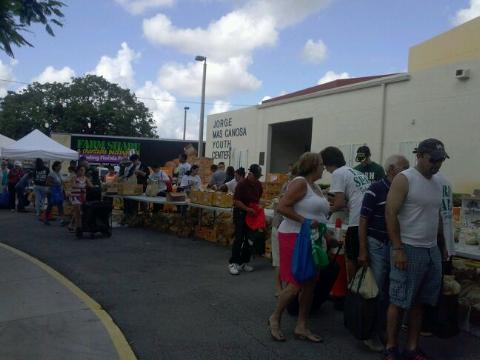It’s not just Sweetwater.
From Little Havana to Homestead, Miami Gardens to Hialeah, elected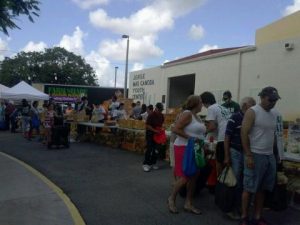 officials often publicize Farm Share distributions in their districts or cities and attend the events — when they really aren’t needed there — to connect the bags of food with needy families at parks and community centers or even parking lots.
officials often publicize Farm Share distributions in their districts or cities and attend the events — when they really aren’t needed there — to connect the bags of food with needy families at parks and community centers or even parking lots.
Sweetwater’s food distribution is in the news because they recently had an election and one of the candidates, the newly-elected Mayor Orlando Lopez, complained that his opponent, then Mayor Jose Diaz, and some council members were using the food distribution to gather absentee ballots.
The investigation did not find sufficient evidence that Diaz was seeking ABs as he distributed the Farm Share bags, but they did recommend that the non-profit agency — which receives monies to operate from federal and state grants — “terminate its relationship with the city and use local religious or non-profit organizations to provide food to needy residents to reduce the temptations of politicians to exploit this opportunity.”
Ethics Commission Director Joe Centorino told Ladra in an email that “these types of distributions are inherently problematic when elected officials are distributing goods on behalf of a non-profit agency or in a city sponsored event, particularly during campaign season. The possibility for abuse with a suggestion that the elected official is somehow to be credited with the distribution is an obvious issue.”
But guess what? About six weeks after that recommendation, Farm Share had another event in Sweetwater. 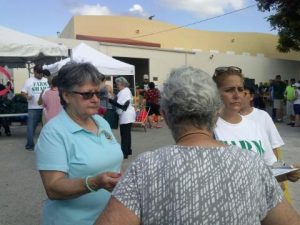 And this time, it was Mayor Orlando Lopez and his ally, Councilwoman Isolina Maroño, acting as the traffic cops directing thousands of residents who stood in line for the bags of groceries to the first table to sign in at the Jorge Mas Canosa Community Center.
And this time, it was Mayor Orlando Lopez and his ally, Councilwoman Isolina Maroño, acting as the traffic cops directing thousands of residents who stood in line for the bags of groceries to the first table to sign in at the Jorge Mas Canosa Community Center.
Were they needed there? No. There were dozens of Farm Share employees or volunteers in official t-shirts that could have done the job. In fact, whenever Lopez and Maroño where directing traffic, there was someone official from the organization next to them anyway.
And there was State Rep. Frank Artiles, who didn’t have any concerns about the city officials exploiting anything.
“That was a problem before. The previous administration was abusing the program,” Artiles said.
It was also five days after the city council passed an ordinance prohibiting elected officials from being involved in food distributions. Councilwoman Idania Llanio proposed the law saying residents that get food from a candidate or elected “then feel obligated to vote” for him or her. Maroño was the only vote against the ordinance.
So why were they there on July 11? To exploit the opportunity, obviously.
“This is totally different,” Lopez told me standing at the front of the line 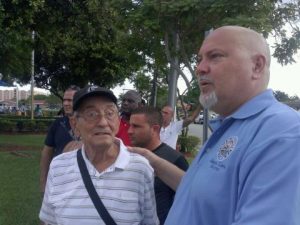 with a blue polo emblazoned with his name and title as he told groups of three and four that they could move forward to claim their prize. “They were telling people that this was coming from the mayor’s office. We’re not saying that.”
with a blue polo emblazoned with his name and title as he told groups of three and four that they could move forward to claim their prize. “They were telling people that this was coming from the mayor’s office. We’re not saying that.”
But wasn’t he?
Ladra asked 12 people in the line if they knew who had organized this and brought this food here. Seven people said either el alcalde or la concejal Marono were responsible for the event. Two people said Farm Share. Three people didn’t know.
It doesn’t have to be spoken, the electeds know they are getting credit for something they didn’t do.
Centorino told Ladra that the commission “will be following this up with a letter making a recommendation to Farm Share that this be avoided, but it will be non-binding. There is no automatic ethics violation where an elected official makes such distributions, only when they cross over into a political statement.”
But Sweetwater is not the only place where they Farm Share is joined by electeds who don’t have to be there. The food-for-votes scam — whether its for absentee ballots or votes down the line (wink, wink, nod, nod) — is rampant.
Last weekend, Commissioner Rebeca Sosa, Sen. Rene Garcia and State Rep. Bryan Avila “hosted” a Farm Share distribution in East Hialeah. 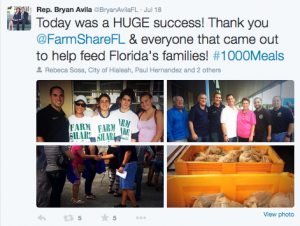 It is such an opportunity, that Commissioner Esteban Bovo and Hialeah Councilmen Luis Gonzalez and Paul “Pablitiquito” Hernandez also showed up.
It is such an opportunity, that Commissioner Esteban Bovo and Hialeah Councilmen Luis Gonzalez and Paul “Pablitiquito” Hernandez also showed up.
“Today was a HUGE success! Thank you @FarmShareFL & everyone that came out to help feed Florida’s families! #1000Meals,” Avila tweeted with four photos from the event, including one in which he is shaking hands with voters, er, I mean needy people who are already humbled enough by standing in line for food.
Sosa posted a 13-second video on Twitter.
In October, she put out a press release from her office, titled “Chairwoman Sosa and Farm Share feed more than 650 families.” She was quoted in it: “It was a blessing to team up with Farm Share once again to help needy families in our community continue to be able to put food on the table.”
But what did she do? Show up?
Sosa is not the only one. Commissioners Bovo, Dennis Moss and Juan Zapata each had their own Farm Share distributions within the last few months.
Farm Share’s director of operations, Virginia Reynolds, would not tell 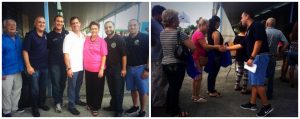 Ladra if they call the electeds or if the elected officials call them. She said the nonprofit’s director, Patricia Robbins, would have to answer all that. But Robbins has not returned the call. They dodged Miami Herald reporters, too.
Ladra if they call the electeds or if the elected officials call them. She said the nonprofit’s director, Patricia Robbins, would have to answer all that. But Robbins has not returned the call. They dodged Miami Herald reporters, too.
At the Sweetwater distribution July 11, Farm Share USDA Director Alfio Ferrea said the organization distributed about 33 million pounds of food last year through more than 100 different agencies, including churches and organziations — and cities and county commission offices. “I don’t look at who is doing it,” Ferrea told Ladra.
The problem is that the clients, or people receiving the food, do look at who is doing it.
The organization should take it upon itself to prohibit all elected officials from taking part in future distributions like this. If they want to volunteer, they can volunteer, to dole out bags of food in a district where voters do not vote for them and wearing Farm Share volunteer t-shirts instead of emblazoned polos that make it look like an official duty as an elected representative.
It’s not a duty. It’s, to quote the ethics commission, an exploited opportunity.
And Kudos to Alex Dominguez, an unsuccessful candidate for county property appraiser and for Miami city commissioner before that, who has stayed actively involved in community issues, like public housing standards, between campaigns — which is more than you can say for some electeds. Even before the Ethic Commission inquiry, Dominguez has been blasting this practice, calling it for the self-promotional political propaganda and exploitation that it is.

